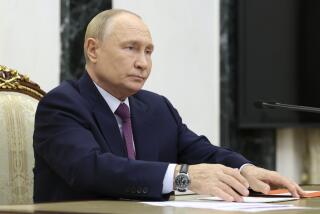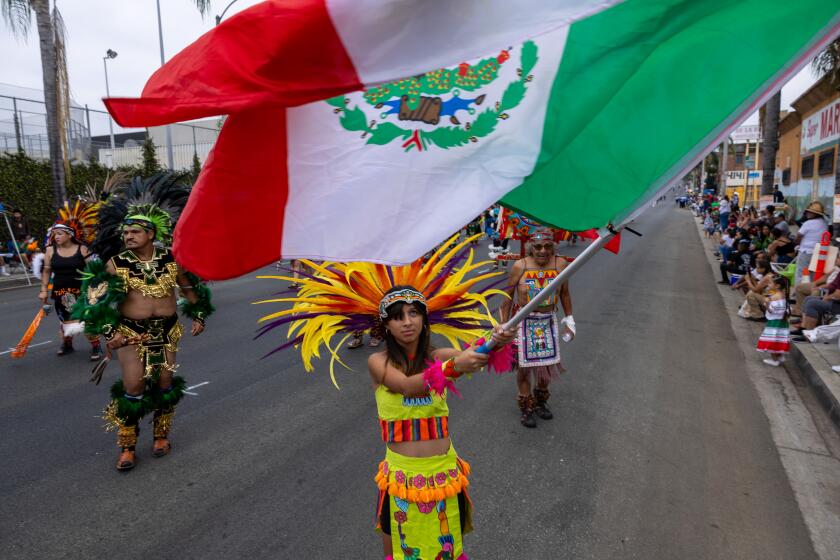Iraqi troops deploy deep in Sadr City
Sadr City residents awoke Tuesday to a sight many had not seen in years: Iraqi soldiers deployed in the deepest reaches of the Baghdad district that is a bastion of militiamen loyal to radical Shiite Muslim cleric Muqtada Sadr.
U.S. and Iraqi officials declared the operation, which took place after talks with Sadr’s followers and met with no resistance, a turning point in efforts to restore government authority in areas long controlled by armed factions.
But it remains to be seen how Sadr’s Mahdi Army militia responds when the Iraqi troops begin searching for weapons and detaining wanted fighters.
U.S. military officials say those being pursued are members of breakaway factions of the militia that have long disregarded the cleric’s orders to set aside their guns.
Sadr loyalists say they are prepared to hand over security responsibility in the district to the Iraqi police and army, but the cleric has rejected the government’s demands to disband his militia. His followers have also made it clear that the truce does not extend to the U.S. military.
“I do not think this is the last of the Mahdi Army,” said Vali Nasr, an expert on Shiite politics at Tufts University. “It will lay low until the dust clears.”
Before dawn Tuesday, columns of Iraqi Humvees and tanks, backed by helicopters, lumbered down streets lined with charred buildings and piles of rubble. The soldiers fanned out over the rooftops and into narrow dirt alleys throughout most of Sadr City, which is home to about 2.5 million people. Others set up checkpoints and began screening vehicles for weapons and fighters.
U.S. forces did not accompany the Iraqi troops.
Sadr’s representatives in the neighborhood, which is named after the cleric’s revered father, who was killed during Saddam Hussein’s regime, welcomed the Iraqi soldiers and presented them with copies of the Koran.
“There is no problem with the Iraqi forces’ operations today in Sadr City, as long as these forces respect the rights of civilians,” said Salah Obeidi, a spokesman for Sadr’s movement.
A national crackdown against Shiite militants began far more violently in late March when Iraqi forces launched a hard-fought campaign in the southern oil hub of Basra that later drew in American and British forces.
That operation triggered a backlash by Sadr’s followers in Sadr City and other parts of the capital that resulted in hundreds of deaths. Sadr’s representatives accused members of Prime Minister Nouri Maliki’s governing Shiite alliance of using the crackdown to weaken the cleric’s movement ahead of provincial elections planned for the fall.
The level of violence in Sadr City dropped after representatives of the main Shiite political factions signed a truce May 12.
Sadr’s followers, who waged two major uprisings against U.S. forces in 2004, said they were prepared to allow Iraqi troops to search the district, provided there were no Americans involved.
Four days later, Iraqi forces began clearing more than 100 bombs from the outskirts of Sadr City in preparation for moving in, setting up patrol stations and restoring services, said Maj. Gen. Qassim Musawi, an Iraqi military spokesman.
He said Tuesday’s deployment took an hour to complete and met no resistance.
U.S. forces did not participate but are stationed nearby in case they are needed, Musawi said.
American forces occupy the southern third of the district, where they have erected a 3-mile-long concrete barrier intended to prevent militants from using the area to fire rockets and mortar rounds at targets including the capital’s fortified Green Zone. More than a thousand shells have been launched, most of them from Sadr City, since the crackdown began in late March.
U.S. officers blame most of the fighting on so-called special groups of Mahdi Army fighters, which they say are armed, funded and trained by Iran -- charges denied by Tehran.
“I think this is the turning point where we start seeing the special group criminals picked up by the Iraqi security forces and a lasting peace for the Iraqi people,” said Lt. Col. Steven Stover, spokesman for U.S. forces in Baghdad. “And it will be because they did it, not us.”
Hassan Suneid, an aide to Maliki, also described the operation as a “new page in Iraq’s history.”
“Since the overthrow of Saddam Hussein, no man representing the law could enter these areas,” he said. “There were no surprises, no negative reactions, because [the troops] entered in an organized manner, which is in itself another victory.”
Soldiers deployed in Sadr City said residents welcomed them with drinks and food.
Many residents remained fearful of the militiamen in their midst, one officer said. “Some elderly people whispered to us that they are happy with our presence, as their city will be peaceful.”
For the first time in nearly two months, Ali Hussein Dagher decided it was safe enough to open his car parts store. About 10 soldiers stood nearby, and he brought out a cooler filled with water for them.
“I don’t remember when I saw them last,” he said, nodding toward the soldiers. U.S. and Iraqi security forces have largely kept to the outskirts since the 2004 uprisings.
Dagher said residents were tired of the recent fighting and would cooperate with the Iraqi soldiers. But others said they were fed up with all sides.
“We accept the presence of these soldiers because we have seen the worst,” said Hussein abu Karrar, a barber whose 12-year-old daughter was shot in the hand during the clashes. “We consider them our [last] hope to plant security in our city.”
But he said some soldiers were already misbehaving, and motioned toward a customer with a thick black beard.
“Please don’t mention my name,” the customer said. “I passed in front of the group of soldiers in that street. They stopped me and forced me to pay 5,000 dinars [about $4.15] because I have a beard. That is why I am here to shave it.”
--
Times staff writers Caesar Ahmed and Saif Rasheed in Baghdad contributed to this report along with a special correspondent in Baghdad.
More to Read
Sign up for Essential California
The most important California stories and recommendations in your inbox every morning.
You may occasionally receive promotional content from the Los Angeles Times.









